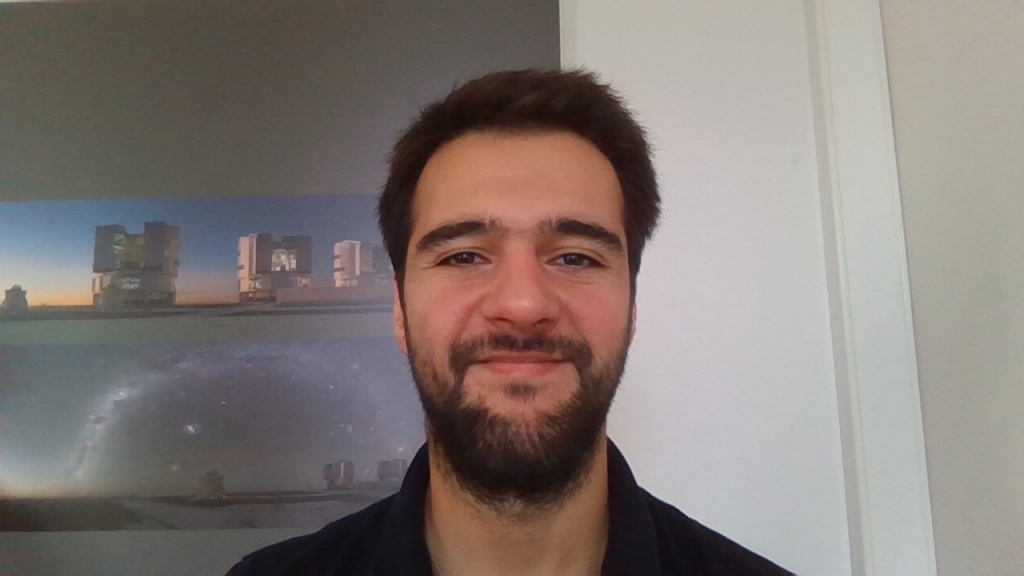EPEC Profiles – José Eduardo Silva
In this series from the EPEC Communication Working Group, we meet members of the Europlanet Early Career (EPEC) community and find out more about their experiences and aspirations.
José Eduardo Silva is a PhD Candidate in Astronomy and Astrophysics at the Instituto de Astrofísica e Ciências do Espaço (IA) in Lisbon, Portugal. He works with spacecraft imaging data of Solar System planets in order to study the dynamics and features of their atmospheres.
Though I was curious and interested in other worlds throughout my childhood, my planetary journey only truly began shortly before I enrolled in a Bachelor of Physics course at the Faculty of Science of the University of Lisbon. My initial curiosity was guided towards stellar birth and interstellar medium (in part due to the seductive and beautiful imagery from Hubble Space Telescope), but I’ve found myself steered towards the study of Solar System planets ever since my Master’s course.
What struck me from the beginning as both magnificent and awe inspiring is the diversity of ‘little worlds’ within such a tiny corner of the Universe (our Solar System), from the scorching wasteland of the surface of Venus, to the icy plains of Pluto – taking a left turn into the strange configuration of the gas giants, planets without a surface and with mesmerizing atmospheric patterns.
Currently I’m close to the ‘end of the beginning’ of my astronomical journey (I hope), working to conclude a PhD in Astronomy and Astrophysics, still in sunny Lisbon. My main focus is on the study of the dynamics of atmospheres of several planets – most recently Venus, although I’m always eager to take a few jabs at other targets. This exploration includes using spacecraft and ground based data to study how the atmosphere behaves and find out about the driving mechanisms that sustain wildly different modes of circulation. To do this, I went in search of particular atmospheric features called atmospheric gravity waves on Venus, one possible key ingredient in powering the enigmatic super-rotion of Venus’ atmosphere (at the cloud top the atmosphere of Venus rotates about 60 times faster than the solid globe).
This bubbling curiosity usually spills over, which has made me find a second passion in my life: sharing this wonderful cosmos of astronomy and planetary sciences with whoever is willing to listen to me. I’ve been involved in outreach activities since 2012, usually stargazing with the general public with a little help from portable telescopes but also small lectures and even sailing across the stars as my Portuguese ancestors once did.
During my PhD I also took the opportunity to teach minor physics courses to Bachelor’s students in other areas, including computing engineering and geophysics. Though only an assistant, this adventure has been the seed of my third passion and ambition: teaching astronomy in an attempt to improve education and elevate this field in my country.
Today, as I’m writing this text and my thesis at the same time, I wonder where this road will lead. I can only hope that my skills in image-analysis and atmospheric characteristion will take me to many worlds in the Solar System, so that then I can share that knowledge back to the wider community because, in my view, science is truly for everyone!
In the meantime I’ll try to continue exploring this world, hiking through the landscape, or other worlds through storytelling around the table.
An essential component to scientific research is teamwork and collaboration. EPEC has provided a wonderful opportunity to meet and work with enthusiastic people who have inspired me in more ways than I can count. It is also the best place to cement the important influence early careers can have in shaping up the science of tomorrow. I’ve been continuously thrilled to be part of the team and give a hand to my fellow colleagues on all things concerning our field and hope for a better future for all of us!
José Eduardo Silva
If you are an Early Career member of the Europlanet Society and would like to be featured in an EPEC Profile, find out more about how to submit your profile.
See all the EPEC Profiles.


